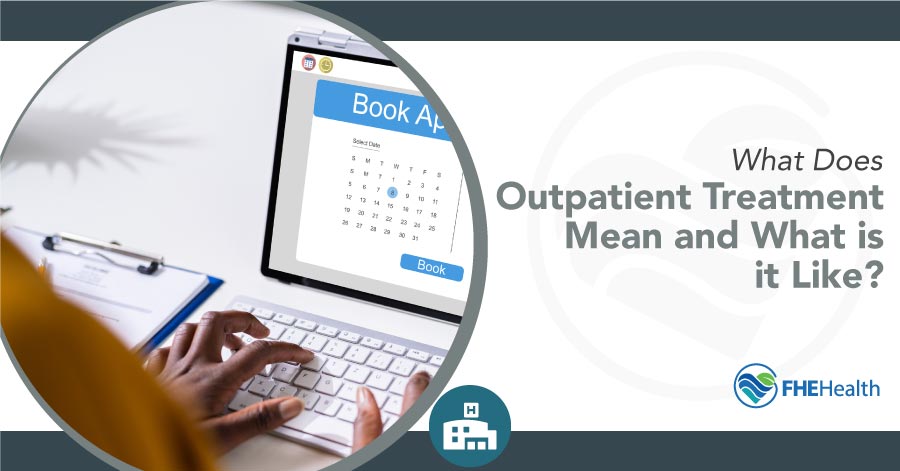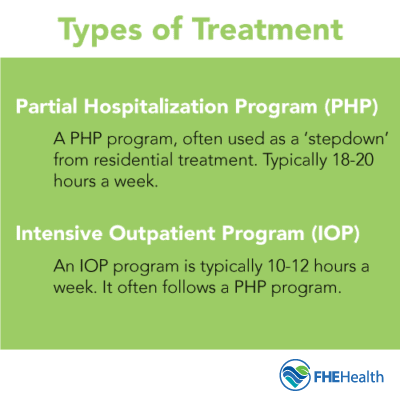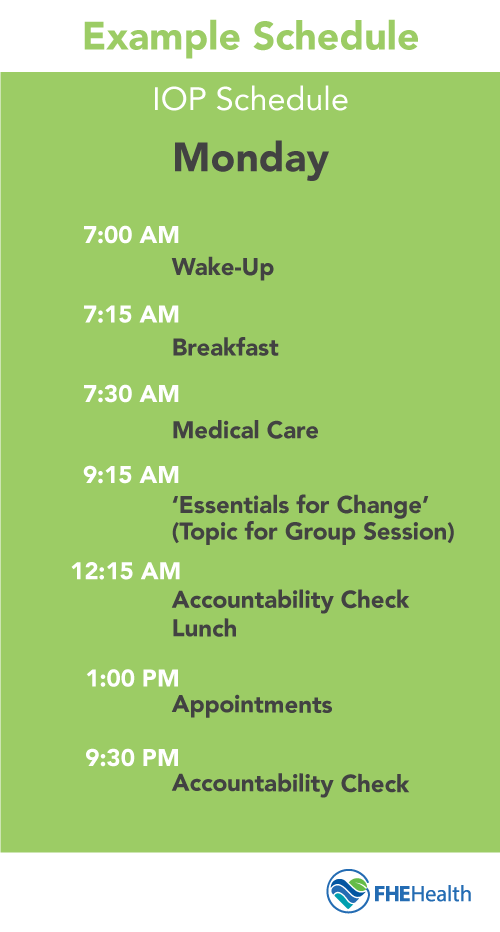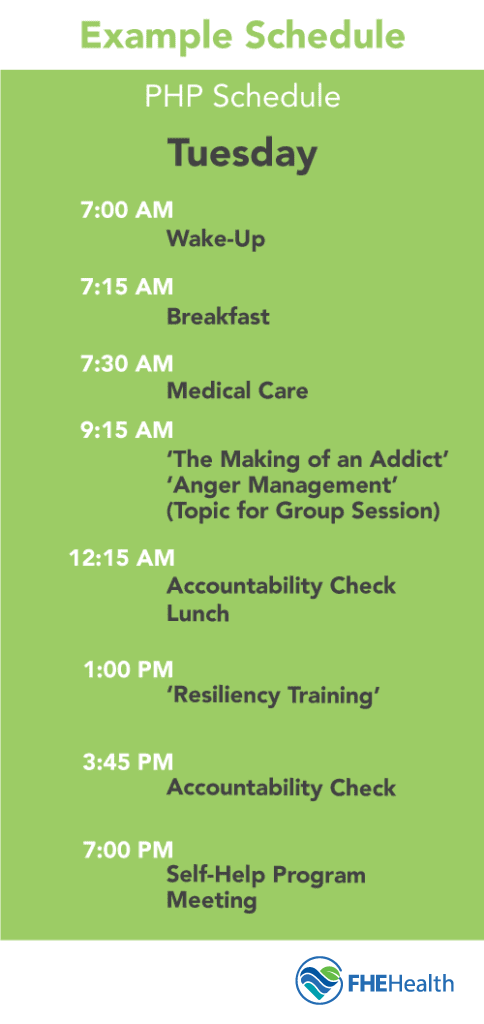
Treatment is an exceptionally important part of long-term addiction recovery. Unfortunately, it’s not as common as it should be — only 11 percent of the estimated 24.6 percent of Americans with substance abuse disorders get treatment.
While this is alarming in itself, many individuals don’t know what a substance plan abuse treatment entails, even those who are a part of the addiction community. It’s regularly assumed that getting help means going to a detox program and perhaps inpatient rehabilitation for a few weeks and then everything will be fine. However, this is generally not the case. Detox and inpatient rehab are only the first steps in what is often a long process.
After successfully completing an inpatient program, the next step is outpatient care. Outpatient care is available in a few different forms, including partial hospitalization and intensive outpatient programs. Here is what you can expect in outpatient treatment following the successful conclusion of residential rehabilitation, including an average outpatient addiction treatment schedule.
What Does Outpatient Treatment Mean?
 As the name implies, outpatient treatment is a form of rehabilitation that does not require a participant to live in a treatment facility. Instead, those in outpatient rehabilitation live either at their own homes or in a sober living house while attending treatment.
As the name implies, outpatient treatment is a form of rehabilitation that does not require a participant to live in a treatment facility. Instead, those in outpatient rehabilitation live either at their own homes or in a sober living house while attending treatment.
Outpatient treatment is generally less intensive than inpatient treatment as participants attend meetings and therapy sessions less frequently. Some forms of outpatient rehabilitation programs take place during the day, around the time span of a normal job, like partial hospitalization programs. Others, like intensive outpatient programs, may take place in the mornings or evenings to allow time for daily obligations.
While participants do not live in the same place they receive treatment, many forms of outpatient care have significant similarities to residential rehabilitation. Outpatient programs run by certified treatment centers utilize a heavy reliance on mental health principles, working to help participants continue to explore the root causes of addiction and coping methods for sobriety. As those in outpatient programs are beginning to transition into normal life, heavy emphasis is placed on staying healthy — mentally, emotionally and physically — outside of a residential environment.
Coursework during treatment includes topics like:
- The making of an addict
- Anger management
- Difficult emotions
- Relapse prevention
- Adaptive coping mechanisms
- Resiliency training
The extent of treatment in an outpatient program can vary largely based on the types of the treatment program and the provider.
PHP vs IOP
 Outpatient programs frequently come in two forms: partial hospitalization programs and intensive outpatient programs. Each of these options offers different advantages, and both are recommended in the course of step-down care.
Outpatient programs frequently come in two forms: partial hospitalization programs and intensive outpatient programs. Each of these options offers different advantages, and both are recommended in the course of step-down care.
Partial Hospitalization Programs
Partial hospitalization programs, or PHP, often span four to 10 weeks and provide a scaled-down version of the care patients are already familiar with. Considered the most intensive form of outpatient care, PHP treatment most closely resembles inpatient treatment in form and time commitment.
Sober living is highly encouraged for those who choose a PHP. This prevents temptation after treatment ends for the day, helping those in rehabilitation to stay focused on sobriety.
Intensive Outpatient Programs
Intensive outpatient programs are a step down from PHP care. Also known as IOP, intensive outpatient programs require less time devoted to treatment but are still quite rigorous and demanding. In IOP, participants usually attend meetings for a few hours a day, several days a week. This allows for time to ease back into work, school and family obligations.
As with PHP, sober living is suggested for participants in intensive outpatient programs. More freedoms can be dangerous for those in recovery, and sober living encourages a responsible lifestyle.
How Much Time Does Outpatient Treatment Take?
Those who have successfully completed an inpatient treatment program are often encouraged by the opportunity to move away from the demands of a residential program. However, it’s important to understand that outpatient treatment still requires a substantial time commitment.
In a partial hospitalization program, participants spend 30 to 40 hours a week attending meetings, treatment sessions and activities related to recovery. This usually entails around 10 to 15 group meetings per week, as well as individual therapy appointments, medication management and life skills training. PHP requires availability during the day Monday to Friday from around 9:00 AM to 3:00 PM.
Intensive outpatient programs are a step down from partial hospitalization, requiring three to five days of commitment a week for around three to five hours a day. Some programs are more flexible than others, with availability in the morning, in the afternoon or in the evening. Under some circumstances, it may be possible to go to work or school while working around an IOP schedule.
What Are the Differences?
Intensive outpatient programs and partial hospitalization programs sound similar, and in many ways, they are. However, it’s important to understand the differences before proceeding with either form of treatment.
While both IOP and PHP programs provide intensive care for those in recovery, the necessary time commitment and, accordingly, the level of support available are generally the biggest differences.
PHPs are intense commitments. This kind of program combines individual and group strategies for a comprehensive approach that spans hours a day most days of the week. This significant time requirement ensures structure and dedication on the part of participants, which makes PHPs ideal for those just finishing inpatient rehabilitation or those who need help managing cravings or withdrawal symptoms. PHPs offer more freedom than an inpatient facility but plenty of programming to keep participants accountable.
IOP programs can be a starting point but are also a possibility following the successful completion of a PHP. These programs are more flexible and require a reduced time commitment but still keep individuals engaged in the recovery process. However, with fewer meetings and thus fewer hours to dedicate to recovery, participants must hold themselves accountable far more than when completing a PHP. IOPs aren’t ideal for those still managing cravings or who are likely to give in to temptation in a less structured environment.
Why Are There So Many Options?
So why aren’t outpatient treatments one-size-fits-all? The answer is simple: because addiction isn’t the same in everyone. People have various experiences with substance use and require differing levels of support to break through their barriers. Some may require inpatient detox and rehabilitation, while others may be able to regain control by completing an intensive outpatient program. It all depends on an individual’s unique needs to best see results. Making the right choice generally comes down to a few different factors:
- Budget: In the United States, health care can be expensive. Inpatient programs are, of course, the most costly, and pricing for outpatient programs usually varies by intensity and duration. In many cases, insurance or Medicare/Medicaid can cover some or all of the cost of care, and some programs have scholarships or low-income options. However, if that’s not a possibility, affordability may be a factor.
- Structure: Some people will require more structure than others depending on the course of rehabilitation. Someone with excellent self-discipline may overcome addiction through occasional group sessions, while others will require inpatient care and outpatient step-down programs to stay on the right road. Outpatient care comes in multiple forms to best accommodate structure in recovery.
- Time commitment: Time commitment goes hand in hand with structure; some programs offer a wider array of programming for those who feel they need it, while others are more flexible and easier to fit in with a job or a family. Always choose the time commitment that best serves your recovery versus what’s easiest or most convenient.
It’s important to consider these elements holistically rather than individually when weighing options. If you need a structured program with a more intensive time commitment to get back to a healthy place, don’t let budget compromise recovery if at all possible.
A Day in the Life in Outpatient Care
 Committing to a program requires adherence to a strict outpatient addiction treatment schedule. In a partial hospitalization program for a participant living in a sober house, a day in the life will be very structured.
Committing to a program requires adherence to a strict outpatient addiction treatment schedule. In a partial hospitalization program for a participant living in a sober house, a day in the life will be very structured.
At FHE Health, partial hospitalization starts first thing in the morning, usually around 7:00 AM. After waking up and having breakfast, participants will take medications, if applicable, and start off the day with group counseling or life skills seminars from 9:15 AM to 12:15 AM. After lunch, coursework resumes, with a second group program from 1:00 PM to 3:00 PM. After this point, another medication session will be held, with an accountability check at 3:45 PM. For those in sober living, a self-help program is held from 7:00 PM to 8:00 PM, followed by medications at 9:00 PM and lights out at 11:00 PM.
The schedule is similar for intensive outpatient programming at FHE, with the morning schedule mirroring that of PHP. However, after morning courses and lunch, participants have time for appointments from 1:00 PM to 3:00 PM with no other afternoon obligations. At 9:00 PM, participants have a second scheduled time slot for medication, followed by an accountability check at 9:30 PM and lights out at 11:00 PM.
Is Outpatient Treatment Right for You?
So, is outpatient treatment right for you?
Perhaps — but preferably if you have already successfully completed inpatient rehabilitation. While some people do begin treatment in an outpatient setting, this isn’t necessarily suggested. By omitting the detox and residential care steps, participants enter programs without the skills, knowledge and emotional preparedness provided by earlier stages.
For those hoping to successfully recover from a substance use disorder, a full continuum of care is highly recommended. When starting from the beginning, those in recovery receive a strong foundation in psychological, emotional and physical wellness designed to provide direction throughout the journey. Missing out on these early stages may result in a less stable, less secure approach to recovery and thus an increased likelihood for relapse.
At FHE Rehab Center, we believe in supporting participants through every step of recovery, from detox to guidance in our alumni programs. Please contact us today to learn more about our outpatient programs.






